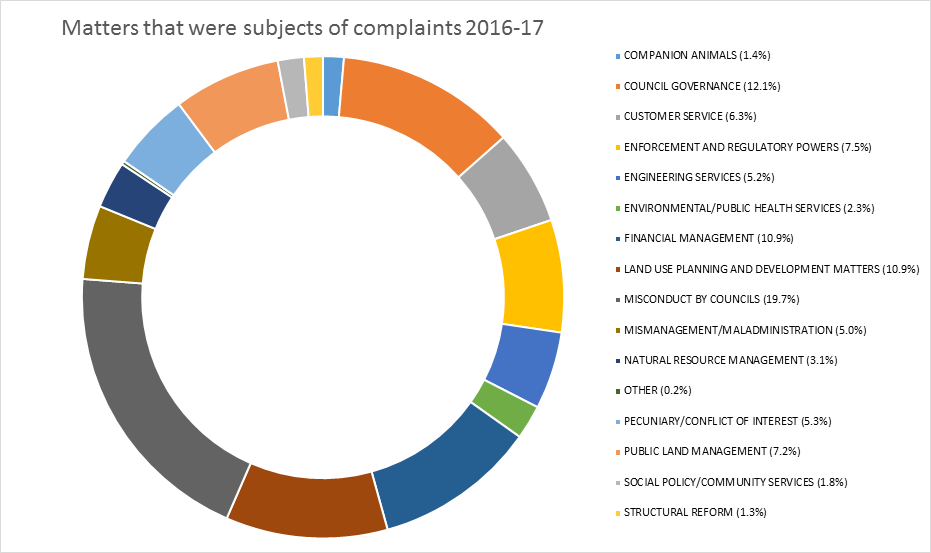Complaint statistics for the July 2016 to June 2017 comparison against the July 2015 to June 2016 period.
The actual number of complaints is not necessarily an effective indicator of the seriousness of the matters raised. In some cases the council may be the subject of campaigns, usually about a single controversial issue. This can distort the council’s reputation if there is in fact no maladministration on the council’s part and the issues relate more to concerns about a particular decision. The Office of Local Government (OLG) generally will not investigate such issues provided the council’s decision is lawful and proper processes are followed.
July 2016 to June 2017 NSW report
Below is a chart showing details of the complaints received during the July 2016 to June 2017 period by keyword.

OLG received 811 complaints in 2016-17, compared to 1,454 in 2015-16. These complaints were spread over 120 councils. The total number of complaints received this year represents a significant decrease over the number received last year (in the order of 44%). OLG also received 19 complaints which did not specify the name of the council that the matter related to.
Pecuniary interest
In 2016-17 OLG received 36 informal allegations of breaches of the pecuniary interest provisions of the Local Government Act 1993 (the Act). Three complaints were also received that met the requirements set out for a formal pecuniary interest complaint. There were two formal investigations of a pecuniary interest complaint under section 462 of the Act commenced in the period.
There were no pecuniary interest matters determined by the NSW Civil and Administrative Tribunal (NCAT) during 2016-17.
Councillor misconduct and political donation complaints
In 2016-17 OLG received 36 complaints alleging misconduct by councillors. This is a 55% reduction from the previous year. No investigations under the misconduct provisions were commenced during this period. NCAT determined four misconduct matters during 2016-17. Two of these matters related to appeals of the Chief Executive’s decisions.
In the two matters that were determined by the NCAT, the outcome was the disqualification of both councillors. One councillor was disqualified from holding civic office for a period of three months for inappropriately approaching Council staff, for failing to comply with Council resolutions requiring the councillor to take certain actions as a result of breaches of the Council’s code of conduct, and for committing acts of disorder at numerous Council meetings. The other councillor was suspended for five months for conduct that was aggressive, intimidating and improper and amounted to verbal abuse. As this councillor had previously been suspended on five occasions, by operation of the law, the councillor was disqualified from holding civic office for a period of five years.
The NCAT determined appeals of decisions made by the Chief Executive relating to the misconduct of two councillors. The Chief Executive’s decision to suspend the councillor’s right to be paid any fee or other remuneration to which he/she would otherwise be entitled as the holder of the civic office for three months for failing to comply with an applicable requirement of the code of conduct by failing to appropriately manage a significant non-pecuniary conflict of interests was upheld. The NCAT set aside the Chief Executive’s decision to reprimand and suspend the other councillor for alleged breaches of the code of conduct.
Two matters were referred to NCAT for its consideration during this period.
Public inquiries
Three public inquiry reports were presented to Parliament in the period 2016-17.
Former Murray Shire Council Public Inquiry
The Public Inquiry Commissioner observed that there was a serious division between the majority and the minority councillors and between the minority councillors and the General Manager. The Commissioner expressed the view that it was unlikely the situation could have or would have improved if the Council had continued. The former Murray Shire Council was merged during the term of the public inquiry.
A number of recommendations were made for policy and procedural reforms to address difficulties arising from managing complaints of bullying and harassment of the General Manager.
Former Auburn City Council Public Inquiry
The Auburn Public Inquiry was called in response to serious concerns about Auburn City Council’s decision-making concerning planning and development matters, and that those decisions might have delivered an inappropriate benefit to some councillors. Council was placed under administration for the duration of the public inquiry process.
While the Public Inquiry Commissioner made a number of adverse findings regarding a number of planning proposals being dealt with by the Council, he expressed satisfaction that subsequent actions by the new Council’s Administrator had placed these matters on hold. In those circumstances, the Commissioner did not make any recommendations relating to these matters.
The Commissioner endorsed the current governance framework protecting the independence of planning staff in relation to the advice provided by them to the elected body.
The Commissioner made recommendations for the new Council in terms of reviewing its road closure processes, maintaining its governance frameworks and improvements to managing conflict between councillors and council staff.
North Sydney Council Public Inquiry
The Public Inquiry Commissioner found certain decisions and administrative arrangements were symptomatic of dysfunction – this included, for a time, the inability of the Mayor to access her own office.
The Commissioner found that the inability of the protagonists within the governing body to manage conflict had resulted in dysfunction in the performance of their statutory functions.
To remedy these matters the Commissioner recommended that a Performance Improvement Order be issued to the Council and a temporary adviser appointed.
